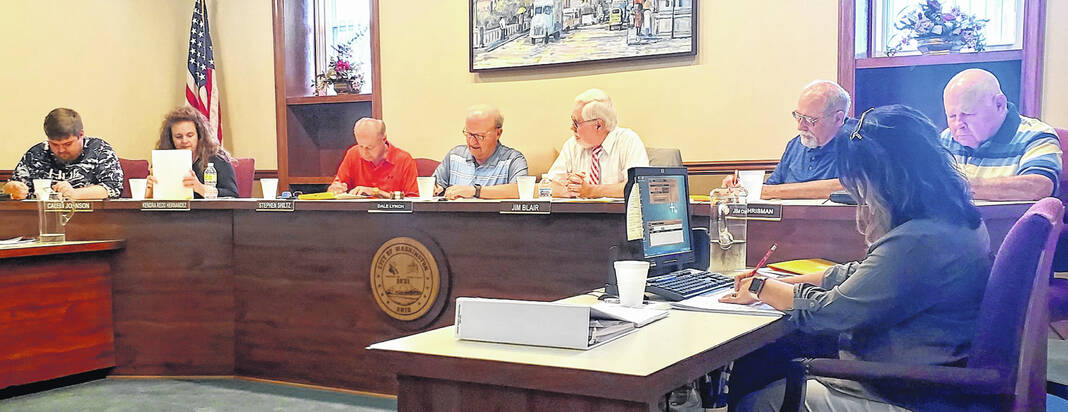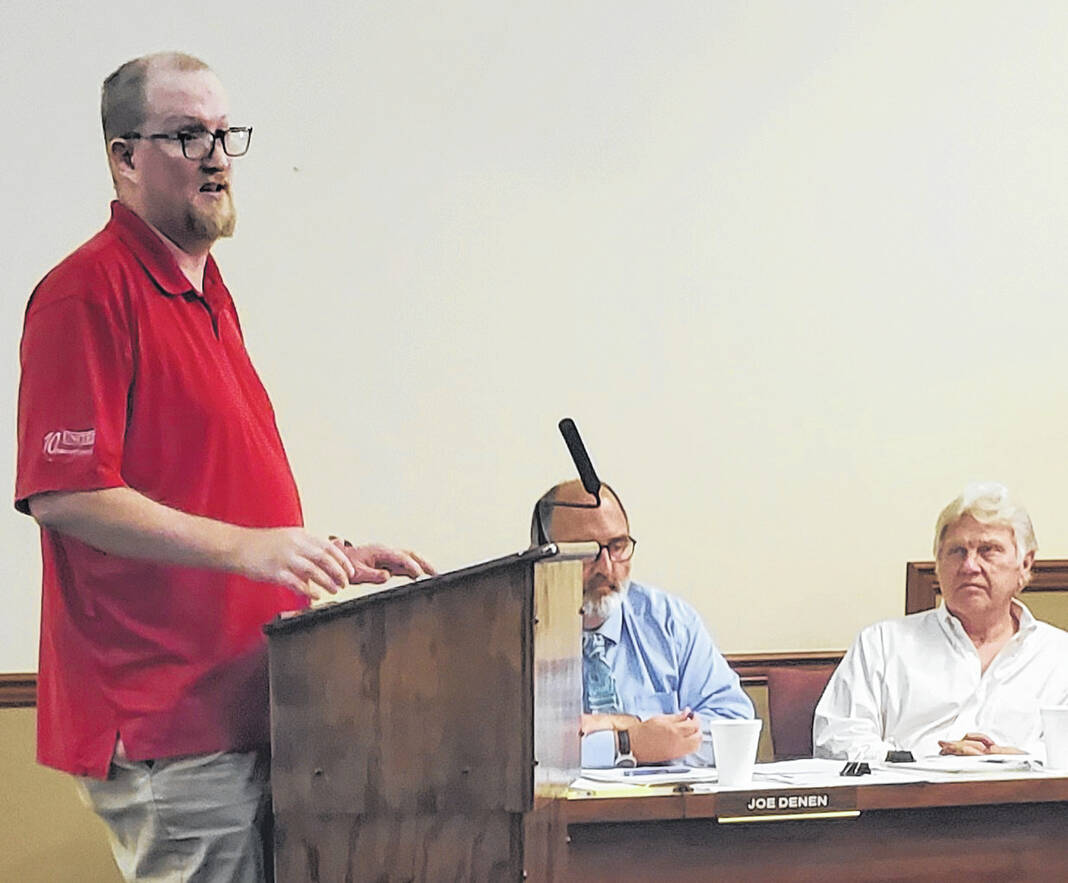

Local residents filled the Washington C.H. City Council Chambers Wednesday night for a public hearing on a proposed “Designated Outdoor Refreshment Area (DORA)” in the downtown area.
The legislation to create a DORA is an ordinance, which was placed on first reading after five of seven council members voted in favor of it. In order to pass and become law, the ordinance must pass two more readings.
Six residents spoke out for the creation of a DORA while three spoke against it during the hearing. According to officials and paperwork for the requested DORA, Main Street Fayette made the request for its creation on behalf of merchants and other retail establishments.
Essentially, a Designated Outdoor Refreshment Area is a specified location in which individuals are able to purchase alcohol from businesses selling it legally and can then take the alcoholic beverage outside the business to visit other locations within the DORA.
The current proposed DORA for Washington C.H. has an area marked around downtown in a “minimal residential area,” according to officials.
The DORA would be highly regulated, according to officials. The suggested hours for the DORA to be in place are the first and second Fridays and Saturdays of the month — 5 p.m. to 10 p.m. on Fridays and 12 p.m. to 10 p.m. on Saturdays. Those participating would have their drinks placed into a specific DORA cup.
As a DORA does not replace a liquor license, according to local small business owner Wendy Smalley, alcohol would only be able to be purchased from the places that legally sell it.
The businesses within the proposed DORA that alcohol could be purchased from include: Woodys Café, Elks Lodge 129, Back En Thyme, and Salty Broads Patio.
Smalley also explained they would card people buying drinks even if they have the DORA cup to be sure no one underage took or found a cup.
Through discussions between the residents present and council members, it was pointed out that if there are businesses located in the proposed DORA that do not want alcohol in their businesses, they can refuse service – similar to “no shoes, no shirt, no service.”
The residents who spoke against the DORA had the following main points:
-Not wanting to raise their child(ren) where people can walk outside with alcoholic beverages or seeing people drink in public.
-Being wary of violent inebriated individuals.
-Not wanting alcohol in the area as there was planned to be church activities and a potential young adult church opened in the area.
-Alcoholism being a problem, and alcohol itself being a drug that alters the state of mind.
-Drunk drivers and their victims.
-If a DORA is allowed, what more will people want next?
During council discussion, council member Ted Hawk said, “number one, I don’t see anything positive about this ordinance. I know it may make more money for business people, but carrying around an open container of a mind altering drug on a Friday night or a Saturday night in a downtown area doesn’t seem to enhance the image of the city, especially if it’s legal to have family time downtown with people milling around with the kids and everything.”
In general, those who spoke in support of a DORA, in particularly local business owner Jay Smalley (who was representing other small businesses present), made the following points:
-Having a DORA would allow for special events to be held in the allotted times it will be active – which could draw more people both locally and from outside the area to downtown for social interaction and involvement.
-More businesses may be drawn to downtown if a DORA was present, which could create more special events.
-Through research, there were no significant negatives found with having a DORA in a small community.
-If the DORA is found not to be beneficial, it can be removed. If it is found to be beneficial, it could be altered in the future.
One speaker, Angela Gebhardt, spoke of when she owned a business downtown a few years ago and did not have to worry about people “falling down drunk” even though they were drinking during the downtown events at that time. She also spoke of other countries where children are around alcohol regularly – to which a few people in the room spoke out that their children would not be allowed around it.
Gebhardt said, “We have this concept of — if you drink, you’re an alcoholic, and you’re going to kill someone. That will keep us backward for the rest of this town’s life if we continue to think that way. Because you drink doesn’t mean you’re an alcoholic. Because you drink doesn’t mean you’re not a Christian.”
Wendy Smalley was the last resident to speak for the ordinance in an attempt to explain and reinforce the notion that the DORA would be highly regulated.
Smalley said, “You’re not going to have a salon trying to sneak wine. You’re going to have that salon saying go to Woody’s and get some wine and come back. You’re not going to have that boutique try to sneak margaritas. You’re going to have that boutique say, ‘hey, go down to Elks or Back En Thyme or go to Salty Broads, grab something and come back.’ Not every business has to participate with the alcohol. Trash cans can be provided.”
She further explained, “It’s okay – just because you see somebody drink doesn’t mean you’re going to drink as well. It doesn’t mean you’re going to have a problem with alcohol. If you teach your children how to drink responsibly – that’s a good thing. This is four days a month guys, four days.”
Smalley also pointed out there are limited liquor licenses available, and there are few licenses left in Washington C.H., so the likelihood of businesses moving in to specifically sell alcohol is low.
According to www.ohio.gov, “In Ohio, the Department of Commerce Division of Liquor Control regulates the manufacture, distribution, and retail sales of alcoholic beverages. It also oversees the merchandising of beer, wine, mixed beverages, and spirituous liquor as outlined in Ohio Revised Code.”
Liquor permits in Ohio are issued based on population and each permit has to be renewed annually.
During discussion, council member Kendra Redd-Hernandez spoke on the topic.
“I own Back En Thyme for those of you who don’t know and, in 2018, I applied for a liquor license. Everyone said that it wouldn’t work in a flower shop, and it does. So, I want to say that my best night of business is the shop hop when I have wine tastings. I have never had a person who was drunk or out of control, ever, never,” said Redd-Hernandez.
She further explained, “I want to comment about the whole child thing. I have a 12-year-old. He is very involved in my store. He is very familiar with wine, and I think, a personal preference, is I teach him that this is not okay with wine, and this is. I’m teaching him how to be responsible. He is very clear that he is not allowed wine or beer until he is 21. We’ve had those conversations. To me it is education, and it is exposure. If you make it bad, if you make it illegal, if you make it, ‘oh, shame, shame’ then guess what? The first thing a kid wants to do is the shame, shame, because they’re not supposed to do that. So, my personal take is that this is the best thing we can do right now. It may need to be modified, it may need to be expanded, it may need to be lessened, but if we want our community to be better, we have to allow change, and change sometimes is scary, but we have to do that.”
Council member Steve Shiltz said, “People say ‘Well, we don’t need it. It’s not good for Washington Court House.’ How do we know? We’ve never tried it.”
Council members Shiltz, Redd-Hernandez, Caleb Johnson, Jim Chrisman and Dale Lynch voted in favor of the ordinance. Council members Ted Hawk and Jim Blair voted against the ordinance.
Numerous comments, speeches and viewpoints were shared during the approximate two-hour-long meeting. To hear the different viewpoints in full, visit the “City of Washington Court House, Ohio” YouTube page where videos of the council meetings are uploaded: www.youtube.com/channel/UCRwMxUBn8XIQTjnSvFaGDgA.
Information on the other legislation and topics addressed during the meeting will be shared in a future edition of the Record-Herald.
Council meetings are held the second and fourth Wednesdays of every month at 7:30 p.m. in the council chambers — located on the second floor of the City Administration Building, 105 N. Main St. in Washington C.H.



